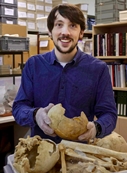Patxi Pérez Ramallo (Max Planck Institute for the Science of Human History, Jena, Germany. Faculty of Medicine and Nursing, University of the Basque Country, San Sebastián-Donostia, Spain), on Tuesday, March 12th at 16:00, room 1.63 (sala "dziekańska"), will give a seminar on "Reading between the bones: osteological, stable isotopes, C14, and aDNA techniques on human archaeological remains". Seminar will take place at the Faculty of Historical Sciences, Adam Mickiewicz University in Poznan, ul. Umultowska 89d (campus Morasko).
Reading between the bones:
osteological, stable isotopes, C14, and aDNA techniques
on human archaeological remains
Abstract:
The aim of the seminar is to illustrate and explain different scientific methods used in archaeology and anthropology, to understand changes in the human condition: from analysing the tempo of change, the effects of shifts in diet and nutrition, to the demographic consequences of major cultural and political transformations. Through highlighting some key cases and explaining used methods I want to introduce the topic to the general public.
Archaeological science and bioanthropology have witnessed a starburst in the application and development of techniques dealing with human skeleton recovery and interpretation, that are providing extra information to the archaeologist or anthropologist and many times changing their first perception and interpretation. The osteological analysis is a non-destructive technique that helps to explore and provides a profile on human remains estimating age, sex, stature, as well as it aids to identify traumas or pathologies. Stable isotope analysis, for instance, has been used to document particular dietary preferences of different social classes, the introduction of new culinary practices into social groups, and changes in human mobility patterns. Radiocarbon absolute dating has been a revolution within the archaeological panorama, being a key method for the interpretation of numerous places and to better understand the past of human societies. Similarly, modern and ancient DNA studies are providing increasingly resolved insights into human migrations, interactions, and even the association of animal, plants, and pathogen movements, linked with periods of major cultural and political change.
Readings:
P. E. Damon et al., Radiocarbon Dating of the Shroud of Turin. Nature, vol. 337, no. 6208, 16th February 1989: 611-615.
Angela L. Lamb et al., Multi-isotope analysis demonstrates significant lifestyle changes in King Richard III. Journal of Archaeological Science, vol. 50, 2014: 559-565.
Simon Roffey et al., Investigation of a Medieval Pilgrim Burial Excavated from the Leprosarium of St Mary Magdalen Winchester, UK. PLoS Neglected Tropical Diseases, published online January 26, 2017 [doi:10.1371/journal.pntd.0005186]
Andrew S. Wilson et al., Stable isotope and DNA evidence for ritual sequences in Inca child sacrifice. PNAS, vol. 104, no. 42, October 16, 2007: 16456–16461.
Patxi Pérez Ramallo received a BA in History with triple specialisation in Archaeology, Prehistory and Medieval Age at the University of Santiago de Compostela (2012). Ramallo also received a MSc in Archaeological Sciences at the University of Bradford (2015). He is currently a doctoral student and researcher in the Forensic Analysis Program at the Faculty of Medicine in the University of the Basque Country (November 2016). Since 2015, he is the head of an interdisciplinary project about the origin and evolution of the Medieval Camino and the Cathedral of Santiago de Compostela.
Patxi Pérez Ramallo is committed to applying archaeological science methodologies such as osteology, stable isotope and aDNA, within multidisciplinary research programmes that are focused on geographical mobility, diet, pathologies and genetics, linked to religious and ritual contexts.
Organizacja:
Alexandra Staniewska - email: alesta@amu.edu.pl

Opieka naukowa: prof. dr hab. Ewa Domańska
 Patxi Pérez Ramallo
Patxi Pérez Ramallo 
